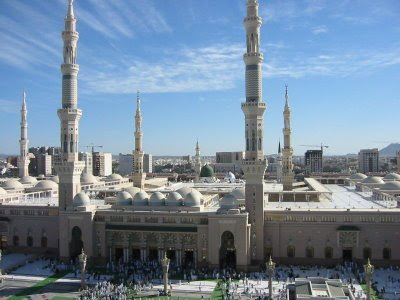
By Neveen Shedid
Reading Islam Team
"I'm here, I'm finally here, All praise to God who brought me here again."
These are usually the first words I utter as soon as my eyes fall on the minarets of Prophet Muhammad's mosque on my way from the airport to the hotel in Madinah.
Throughout my ride, I keep staring out of the window of the bus trying to just catch a glimpse from a distance of Prophet Muhammad's mosque.
I've been visiting Madinah every Ramadan for the last fifteen years. I believe this is a great blessing from God because once your feet step on the ground there, you feel what thousands of pictures cannot tell or transfer: the spirit of Madinah, Prophet Muhammad's city.
Although I visited Madinah so many times, I still feel the very same happiness I felt the first time I went there. The feeling of serenity overfills me every time.
Although Madinah has witnessed its fair share of modernization, it still hasn't lost its spirit of peace and tranquility. And no wonder, as it is the city to which Prophet Muhammad migrated 1400 years ago, lived in, and is buried in.
As I sit in Prophet Muhammad's mosque or wander in the streets of Madinah, a thought always strikes me: could I be stepping on the ground that the Prophet's feet once touched? Could I be sitting in a place that Prophet Muhammad once sat in?
And I pray: "Oh God, let my feet touch a spot Prophet Muhammad's feet once touched."

A Garden From Paradise
"As I look at the faces of these women, I ponder at the amount of love they carry for a man they never met!" There are two timings for visiting Prophet's Muhammad grave for women, as the grave lies in the men's section of the mosque. As soon as the doors open for women to enter, hundreds and thousands of women rush towards the grave to try to pray in the area called Al-Rawdah Al-Sharifah (the area now between Prophet Muhammad's grave and his pulpit).
Prophet Muhammad once said, "There is a garden from the gardens of Paradise between my house and my pulpit." (Al-Bukhari)
Inside the Rawdah, you can see women from different ethnicities, speaking different languages, all gathered in this place for one reason: the love of Prophet Muhammad.
They look with love to each other with tears filling their eyes, praising God and thanking Him for enabling them to stand in this blessed place.
They raise their hands praying to God to forgive their sins and asking Him to grant them their wishes in this life and the Hereafter, for they stand next to the grave of Prophet Muhammad, the most beloved person to God.
A Pure Love
As I look at the faces of these women, I ponder at the amount of love they carry in their hearts for Prophet Muhammad, a man they never met, spoke with, or even saw, but still they love him as if he's living among them, and he is even dearer to them than their closest ones.
This enormous love to Prophet Muhammad stems from their appreciation to what he has been through in conveying the message of Islam, and the hope for his intercession to them on Judgment Day.
They carry for him a pure kind of love, incomparable to any other kind of love, a love that God placed in the believers' hearts for Prophet Muhammad, the mercy He sent to mankind.
When I sit in Prophet Muhammad's mosque and reflect upon all the incidents that happened to me throughout the year, I feel that my problems are very shallow and trivial.
Days and days we worry about tomorrow, forgetting the fact that it's all in God's hands and that we should truly rely on God as Prophet Muhammad did when he left Makkah, the most beloved place to him, and migrated to Madinah. That is one great lesson in reliance on God.

I look forward every year to visiting Prophet Muhammad's mosque to recharge my batteries of patience, and perseverance, and increase my faith that God always does what's best for me, but I'm the one who sometimes fails to read His signs.
The Bliss of Solitude
I always leave with the hope of coming back the next year, but as big as my hopes are, I also realize the fact that this visit might be my last one, a fact that I can't deny.
So I leave with tears in my eyes asking myself the inevitable question: Will my eyes ever fall again on the green dome where Prophet Muhammad (peace be upon him) is buried under?
My faith in God answers this question, and I find my solace in His words for God says in the Qur'an what means,
{And whoever obeys God and the Messenger, these are with those upon whom God has bestowed favors from among the prophets, the truthful, the martyrs and the pious, and a goodly company are they.} (An-Nisaa' 4:69)
I recall a poem I memorized at school when I was a child. It spoke about daffodils and how a beautiful memory can flashback and comfort you.
For oft, when on my couch I lie
In vacant or in pensive mood,
They flash upon the inward eye
Which is the bliss of solitude (William Wordsworth)
To me, the memory of the visit to Prophet Muhammad's mosque is my bliss of solitude.
http://picturesofmosques.blogspot.com/
Excerp;
http://www.readingislam.com/















